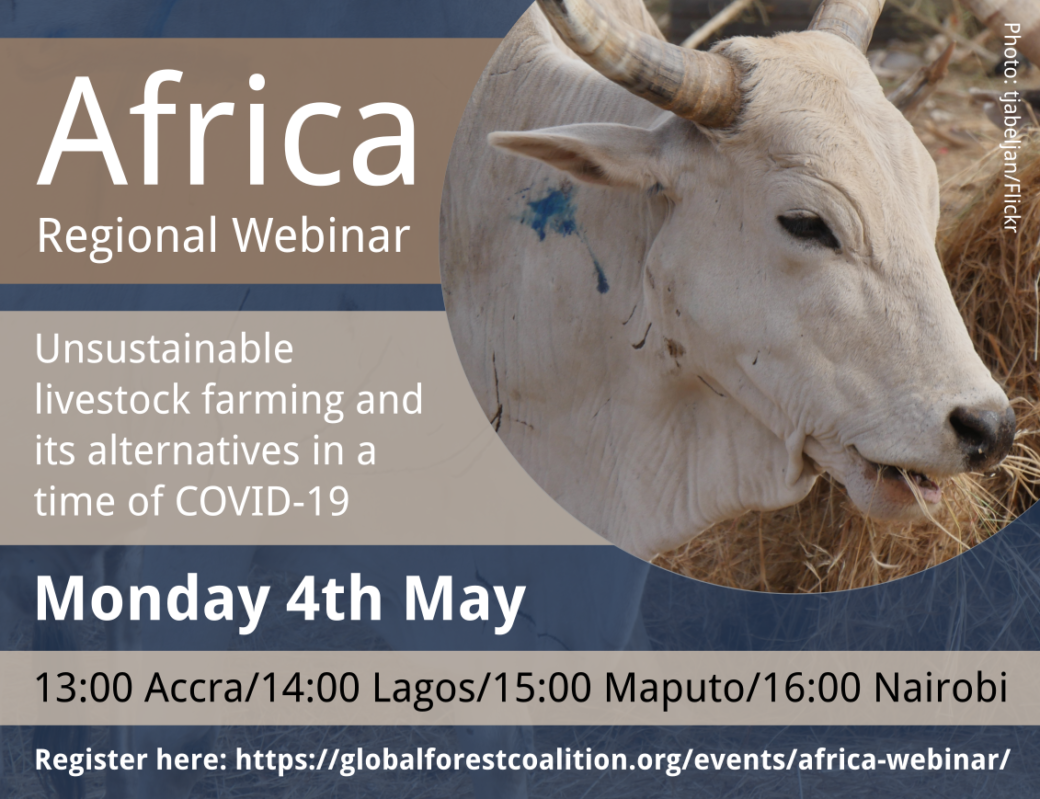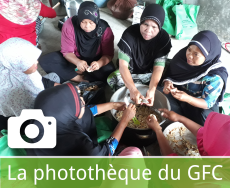Africa regional webinar: Unsustainable livestock farming and its alternatives in a time of COVID-19

[Enregistrement disponible ici]
The Global Forest Coalition (GFC) invites you to participate in a regional webinar focusing on unsustainable livestock farming and its alternatives in Africa on 4th May, part of a series of webinars taking place throughout April and May.
Translations to/from French available!
Webinar agenda:
- Facilitator: Ruth Nyambura (GFC, Kenya)
- Introduction to the dialogue: Isis Alvarez (Unsustainable Livestock Campaign Coordinator, Global)
- Presentations:
- Boa Monjane (Former LVC, Mozambique) – Livestock and the broader agrarian question in Southern Africa at the time of COVID-19 crisis
- Lucy Mulenkei (IIN, Kenya) – COVID-19, deforestation, women, and pastoralism in Kenya
- Zelealem Tefera (ICCA Consortium, Ethiopia) – Livestock practices in Indigenous Peoples and Community Conserved Areas and Territories in Ethiopia and the threat of COVID-19
- Fatai Aina (AMAF, Benin) – National Campaign to Promote the Reduction of Meat Consumption in Benin
- Mohammed Bayazene (IPPAC, Niger) – COVID 19, An Additional Threat over already Weakened Pastoralist Economy In Sahel Region
- Hindou Oumarou Ibrahim (Chad, GFC)
- Mochire Diel (PIDP, DRC) – The Impact of Traditional Livestock in the Fight Against Change Among Forest’ Pygmy Indigenous Peoples in the DRC
- Q&A + Open space for dialogue
- Closing
To participate, please register here. The webinar will take place on Zoom, which you can download here. The meeting will be held in English with interpretation in French.
These webinars build on three regional open dialogues that GFC recently hosted, starting with an African regional dialogue in Addis Ababa, Ethiopia, in September 2019 which took place back-to-back with the 3rd African Animal Welfare Conference. The Latin American dialogue was then held in Santiago de Chile at the People’s Summit in December 2019 and lastly, the Asian regional dialogue took place in February 2020 in Bogor, Indonesia.
These events highlighted commonalities between the different regions, as well as dynamics specific to them. The extent to which agro-industrial livestock and feedstock production is responsible for deforestation, biodiversity loss, GHG emissions, land grabbing, rights violations for Indigenous Peoples and local communities, and health issues in both urban and rural contexts was made clear by participants, who shared their experiences. A comprehensive report on the outcomes of the dialogues can be found here.
To build on the conversations that have already started and take stock of the stark changes that the world is facing as the COVID-19 pandemic rapidly expands, we are organizing 3 follow-up regional dialogues the coming months, including a global dialogue. The webinars will present the results from each of the regional dialogues, and discuss at a regional level the links between the coronavirus outbreak, industrial livestock farming, climate change, deforestation & biodiversity loss, food sovereignty, health, and Indigenous Peoples and Local Communities.
Recently, international bodies such as the Intergovernmental Panel on Climate Change (IPCC) and the Intergovernmental Science-Policy Platform on Biodiversity and Ecosystem Services (IPBES) have recognized the livestock industry as one of the most harmful sectors, which has put a spotlight on the issue globally and given campaigning on livestock and feedstock production momentum in international and national policy arenas.
Guest speakers will address the impacts of agro-industrial livestock and feedstock production in their countries, as well as the traditional and agro-ecological practices that are threatened because of it. They will also look at the implications of COVID-19 for Indigenous Peoples, pastoralists, and peasant farmers, and the struggles that they face. Finally, we will discuss strengthening the Global Alliance on Unsustainable Livestock and ideas for effective advocacy work.










